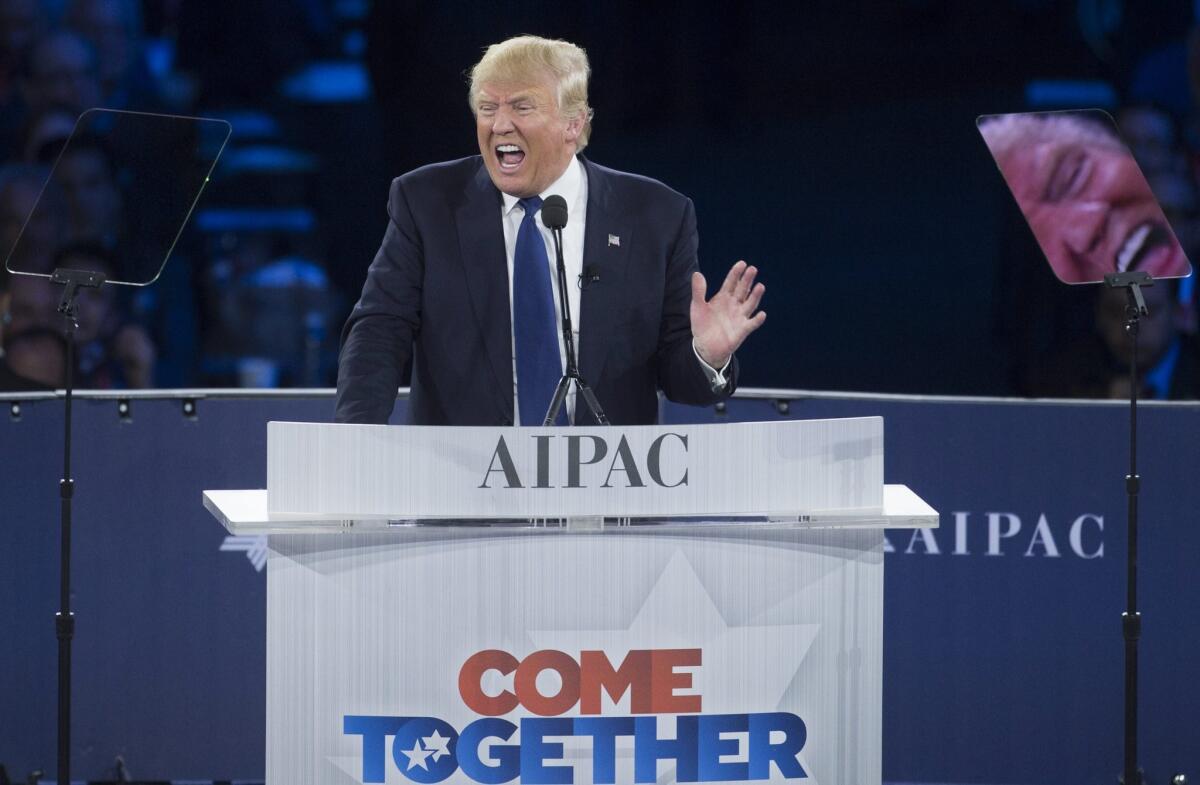Editorial: Believe it or not, Donald Trump is right on neutrality in the Israeli-Palestinian conflict

Republican presidential candidate Donald Trump delivers remarks at the American Israel Political Action Committee (AIPAC) Policy Conference in Washington, D.C. on Monday.
- Share via
When Donald Trump said in February that he hoped to be a “neutral” party in the century-old dispute between Israelis and Palestinians, he probably had no idea what he was wading into. He doesn’t know a whole lot about foreign policy, and to an ordinary person, a neutral arbiter no doubt sounds like a good thing to have in a conflict between two intransigent enemies.
And it is, if what Trump meant was that the United States should be an honest broker working to build trust between the parties and injecting a measure of reason into an extraordinarily emotional debate. That’s exactly the role the U.S. should play.
But in the cynical world of American political campaigns, you just don’t say such things about the Israelis and the Palestinians. Hillary Clinton and Ted Cruz know that well, and that’s why they blasted Trump at a meeting Monday of the American Israel Public Affairs Committee.
“America can’t ever be neutral when it comes to Israel’s security or survival,” Clinton said. “Because in Israel’s story, we see our own, and the story of all people who struggle for freedom and self-determination.”
“Let me be very, very clear,” Ted Cruz told AIPAC. “As president I will not be neutral. America will stand unapologetically with the nation of Israel.”
But did Trump really say something so wrong? It is absolutely true that the United States has a long-standing alliance and a strong bond with Israel. The U.S. (and this page) support Israel’s right to live safely and securely within well-defined borders, free from suicide bombers, defended from enemies. There is no reason the U.S. shouldn’t articulate those positions or reassert its long, close cultural, political and strategic relationship with Israel.
But that should be matched by strong support for a fair, equitable two-state resolution to the conflict. The problem with the “no neutrality” pledge is that it inevitably privileges the Israeli point of view over the Palestinian point of view at the negotiating table. It makes it more difficult for Palestinians and their leaders to trust the U.S. It reflects and entrenches an American reluctance to criticize Israel when it builds new settlements, uses disproportionate force or seeks to muzzle its detractors. It means the U.S. is too often seen by the world not as an honest broker but as “Israel’s lawyer.”
Four years ago, candidate Mitt Romney said, “We will not have an inch of difference between ourselves and our ally Israel,” and that if he had a question, “I’d get on the phone to my friend Bibi Netanyahu and say, ‘Would it help if I say this? What would you like me to do?’”
That’s ridiculous. American presidents must remain independent and make their own decisions for the good of the country they lead. If they disagree with Israeli leaders, they must feel free to say so, just as they must be free to criticize Palestinian leaders if they encourage or condone violence against Israelis or don’t live up to their agreements.
Donald Trump’s foreign policy ideas are usually simplistic, if not ignorant. But even a stopped clock....
Follow the Opinion section on Twitter @latimesopinion and Facebook
More to Read
A cure for the common opinion
Get thought-provoking perspectives with our weekly newsletter.
You may occasionally receive promotional content from the Los Angeles Times.






